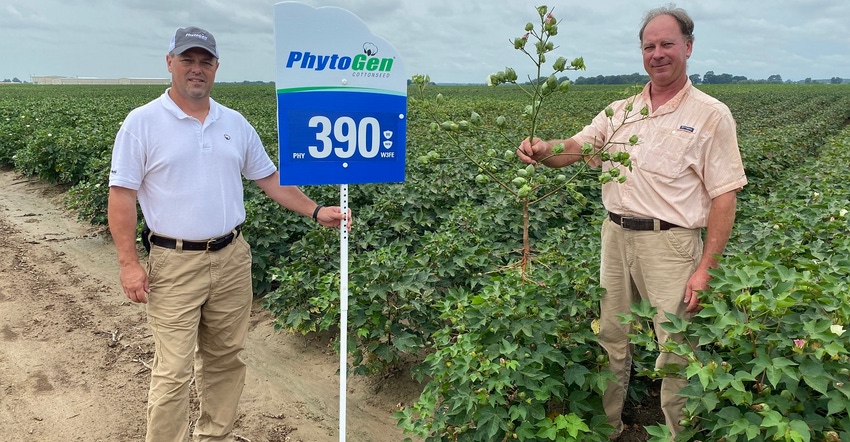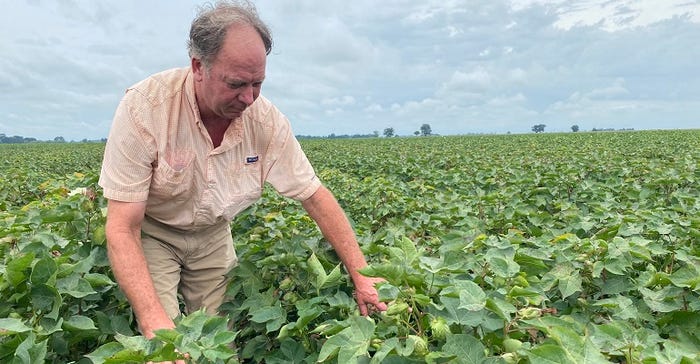June 15, 2021

Sponsored Content
Sometimes you stand at the crossroads and know it's time for a change.
Clarksdale, Mississippi, producer Turner Massey was at that junction going into the 2019 season. After more than a decade of corn-on-corn production, root-knot nematode (RKN) populations had skyrocketed on his farm. He began the search for a new solution.
"With 13 years of continuous corn, we had developed high nematode pressure, so we started looking at other alternatives," Massey said. "We first tried rotating 400 acres into RKN-resistant soybeans, but those soybean varieties only had moderate resistance. We needed something more."
He also tried several crop protection solutions, but the RKN populations were too severe — he didn't see an advantage. That's when Massey decided it was time to go back to cotton. Prior to 2006, Massey had planted 95% of his acres to cotton and worked with a breeder for PhytoGen® cottonseed to test RKN-resistant varieties on his farm. He remembered the row-to-row difference between the resistant and susceptible varieties and thought the newer RKN-varieties might be even better. He was right on target.
In 2019, Massey moved to a 50-50 corn-and-cotton rotation on his best acres, choosing PhytoGen brand PHY 350 W3FE and PHY 390 W3FE for their built-in, season-long RKN resistance. Massey said the resistant varieties provided longer nematode protection without the added crop protection applications and handling. He saved time and money with greater peace of mind.
"One of the best things about the root-knot resistant PhytoGen varieties is that the plant is working for you all season, day and night," Massey said. "It's not like the chemistries that only last for a short period."
Another benefit was high yields
PhytoGen cottonseed offers RKN protection in its highest-yielding varieties for the Midsouth, and the newest varieties have protection against both root-knot and reniform nematodes. Massey averaged 1,395 pounds/A across approximately 1,600 acres that first year, a very high yield for a mostly dryland crop.
"We ran two pivots twice and one pivot once, and we didn't lay any polypipe," Massey said. "We were very pleased with the yields."
PhytoGen Cotton Development Specialist for Mississippi, Tom Eubank, Ph.D., works with Massey and other producers to conduct variety trials and make recommendations for their farms. Eubank said nematode resistance protects root structures, which can make plants more efficient in water uptake.
"Because of our nematode protection, we're getting more aggressive root system development, and we're not having to irrigate our varieties as much compared to something that is more susceptible to nematodes," Eubank said. "We're doing some studies now to see if we can limit the amount of irrigation our varieties need, which could lower costs and benefit the aquifer."

Enlist™ weed control system brings more to the table
In addition to nematode protection and high yields, Massey plants PhytoGen W3FE varieties because of the Enlist™ weed control system. He believes it's the best weed control available and successfully manages both Enlist® cotton and dicamba soybeans on his operation.
"The Enlist system works very well, and we have experience with both systems, because we're farming PhytoGen Enlist cotton and dicamba soybeans," Massey said. "Both systems work well, but the Enlist system appears to offer better weed control than dicamba. Talking with farmers who plant both systems in cotton, I've heard people say their PhytoGen Enlist acres were clean, but they needed to chop their dicamba acres."
Massey also believes Enlist One® herbicide is a "much better chemistry" compared to dicamba herbicides because of its near-zero volatility and fewer applicator restrictions. He used the Enlist weed control system to clean up several fields with significant glyphosate-resistant pigweed populations.
"We had a field with a tremendous, horrible seed bank of pigweeds. We've historically had issues in that field when it was planted to soybeans, sesame and corn," Massey said. "With Enlist One, we cleaned up the fields and took the weeds out."
With fewer weeds competing for moisture, Massey's cotton acres are better positioned to utilize rainfall and irrigation. That's good stewardship of the land and his bottom line.
After planting PhytoGen brand varieties in 2019 and 2020, Massey is dialing in the variety prescription on his farm.
"PHY 390 W3FE was my highest yielder last season, but PHY 350 W3FE was really close — and it is the best fit on my sandier soils," Massey said. "I planted both of those this season, as well as PHY 332 W3FE. That's a new variety with both RKN and reniform resistance, so we're looking forward to see what it will do this season."
For more information, go to PhytoGenCottonseed.com.
About the Author(s)
You May Also Like




